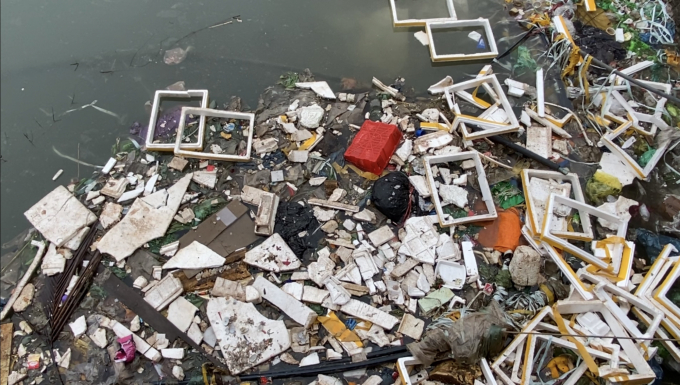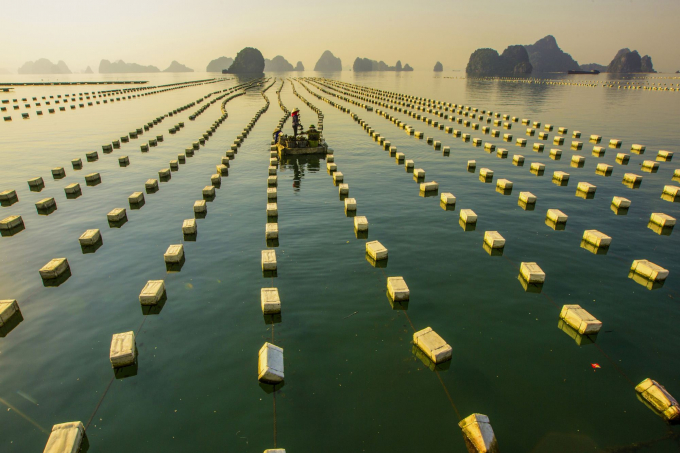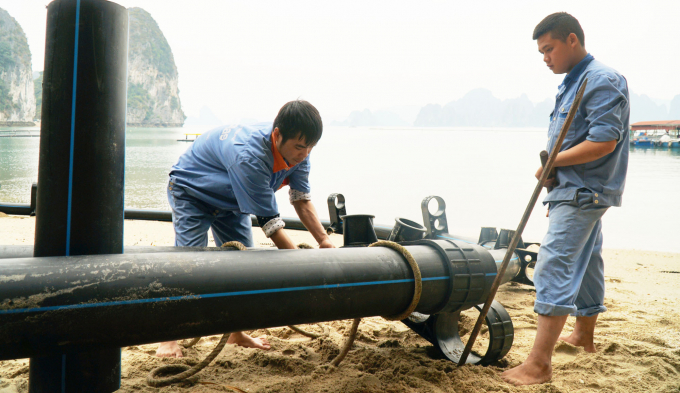May 30, 2025 | 15:59 GMT +7
May 30, 2025 | 15:59 GMT +7
Hotline: 0913.378.918
May 30, 2025 | 15:59 GMT +7
Hotline: 0913.378.918

Plastic waste, mostly foam buoys are seen in coastal area in Van Don District, Quang Ninh Province. Photo Anh Thang.
Nguyen Van Phu, of Ha Long Commune, Van Don District in the coastal province of Quang Ninh has raised aquaculture for nearly 30 years.
He said that since 2008, more and more local people have been raising aquaculture at floating farms. With styrofoam buoys widely used at the farms, they spend less but earn much more than conventional farming.
However, according to a survey on plastic waste in Ha Long bay conducted in 2018, styrofoam buoys is among the five most popular plastic waste detected. Notably, styrofoam buoys accounted for 70 per cent of the detected plastic waste there.
Currently, Quang Ninh Province has nearly 20.000 aquaculture raising cages, mostly in Cam Pha, Van Don, Dam Ha, Hai Ha and Mong Cai.
Most of the fishing cages are made of wood, foam buoys due to the materials are much available, cheap and easy for people to manage.

Thousands of foam buoys are used at aquaculture farms in Ha Long Bay. Photo: Anh Thang.
Nguyen Van Cong, director of the province’s Agriculture and Rural Development Department said that local authorities recognised the negative impacts of styrofoam buoys on the marine environment.
The agriculture department studied and proposed standards for materials used to make floating buoys in fishing farms.
The standards were expected to help local authorities better control environmental issues relating to coastal aquaculture farms.
In 2015, the department developed projects on using new materials to increase productivity, production and ensure environmental protection at aquaculture farms, Cong said.
Notably, the department implemented a project on using High-Density Polyethelene (HDPE) to make aquaculture-raising cages. As many as 30 households joined the pilot programme with a total area of about 6,000 sq.m.
“Until 201, the HDPE project generated positive results as the HDPE cages effectively dealt with farming conditions in Quang Ninh including temperature, salinity and sea weather and most importantly, the HDPE cause no harm to the environment,” he said.
In May 2021, Quang Ninh province People’s Committee issued Decision No30/2021/QD-UBND on amending and add technical standards for floating materials used in aquaculture farming.
The move reflected the vision and responsibility of local authorities in ensuring marine economic growth go in line with environmental protection.

HDPE is used to make fish cages. Photo: Anh Thang.
Accordingly, from the beginning of next year, aquaculture farms in the province must shift to use materials that meet the standards.
Until now, two enterprises based in the province registered to use HDPE.
Super Truong Phat Plastic Joint Stocks Company developed aquaculture-raising models with items made from HDPE, for example, cages, buoys and floors to raise oyster, fish and seaweed.
Nguyen Thi Hai Binh, the company director said that the HDPE could be used for up to 30-50 years. It is safe to water resource, stainless.
As Quang Ninh was usually hit by 6-7 storms yearly, aquaculture growers faced risks to their safety and property, she said, adding that it was reasonable to use HDPE.
“ As an HDPE supplier, Super Truong Phat Company offers assistance to aquaculture farms in shifting to use the new materials as well as permanent warranty,” she said.
However, after recent inspections, the Department of Agriculture and Rural Development found that people still use foam buoys and some ball/rectangle-shaped buoys that are sold on the market without meeting legal requirements.
/2025/05/29/5625-12-214801_567.jpg)
(VAN) Provincial mergers in the Mekong Delta promise to streamline administration, expand inter-provincial raw material areas, and foster close linkages in agricultural value chains, benefiting both businesses and cooperatives.

(VAN) Merging Mekong Delta provinces contributes to the expansion of agricultural raw material areas, addressing previous constraints caused by provincial boundaries. Additionally, this expansion will reduce costs and strengthen linkages between businesses, cooperatives, and farmers.
/2025/05/29/1043-2-153730_145.jpg)
(VAN) The Government's policy to merge provincial-level administrative units opens up major opportunities for the Mekong Delta region to reshape its agricultural development strategy toward large-scale production, effective regional linkages, and sustainability.

(VAN) The mutual export of agrifood products between the European Union (EU) and the United Kingdom (UK) must occur again without certification, border controls or other red tape. This was agreed at the UK-EU summit.
/2025/05/22/5121-2-173645_677.jpg)
(VAN) NBSAP Tracker identifies strengths and areas for improvement in the National Biodiversity Strategy, based on each region’s priorities and capacities.

(VAN) The draft amendment to the Circular on rice export trading stipulates a periodic reporting regime for rice exporting enterprises.

(VAN) Dong Thap farmers attained an average profit margin of 64% during the summer-autumn 2024 crop (first season), while An Giang and Kien Giang farmers followed with 56% and 54%, respectively.